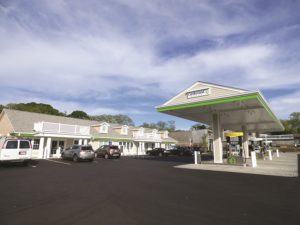Cumberland Farms, along with other convenience stores, is one step closer to selling alcohol and upending the current system of liquor sales licenses.
The Mass. Supreme Judicial Court (SJC) on May 26 upheld Attorney General Maura Healey’s decision to certify a proposed ballot question from Cumberland Farms that would allow convenience store chains, supermarkets, and national retail corporations to sell beer and wine and hold unlimited numbers of licenses across the state.
Independent liquor store owners are unhappy with the decision.
Their trade organization, MassPack, argues that the ballot question would create a monopoly for large convenience store and supermarket chains.
“This ballot question is designed to completely deregulate licenses,” said Robert Mellion, executive director of MassPack. “Unlimited licenses in this state is not good for anybody.”
He said the initiative would devalue licenses for small, independent businesspeople and ultimately cost jobs.
In November, MassPack filed suit claiming that the Cumberland Farms-backed initiative should not have been certified because it violated subject matter rules established in the state constitution.
“The question … would create unlimited alcohol licenses for all food stores, phase out limits on how many off-premise licenses one entity can hold, change I.D. requirements, and increase enforcement funding to the ABCC,” according to MassPack’s website.
But the SJC ruled that the proposed law did not improperly combine these different topics. The ballot initiative is known as the “Food Stores Initiative.”
Cumberland Farms, based in Westborough, operates 567 convenience stores in seven northeast states and Florida, according to conveniencestorenews.com. In October, Cumby’s was acquired by British retailer EG Group. The chain has stores in Provincetown, Wellfleet, and Eastham.

In 2015 the town of Wellfleet was involved in a legal battle with Cumberland Farms over the town’s formula business bylaw. Cumberland Farms appealed a decision by the town’s zoning board of appeals to deny Cumby’s proposed development plans based on the town’s bylaw. The Mass. Land Court ruled in favor of the convenience store chain, and overturned the formula business bylaw.
The Outer Cape is full of independently run liquor and package stores that may soon be forced to compete with the chain in beer and wine sales.
John Gainey, who owns Yardarm Liquors in Provincetown and Pamet Valley Package in Truro, and Leslie Plumb, who, along with her husband Kevin Plumb, own Town Center Wine and Spirits in Eastham, both declined to comment.
Cumberland Farms did not respond to a request for comment for this story.
When interviewed for the Independent’s Dec. 19 story “Chain Stores Eye Outer Cape Market,” Leslie Plumb said she was concerned the Cumberland Farms initiative would create a monopoly in the industry.
Jerry Swartz, who manages Glass Half Full in Provincetown, isn’t afraid of the competition.
“It will just be like supermarket wine,” Swartz said. “Where are they going to put the wine? Next to the Slim Jims?”
MassPack is concerned about lifting the cap on the number of licenses a food store could have.
Under the current law, the number of package store licenses that a single entity may hold is capped at one per town, two per city, or nine statewide.
But the proposed law would phase out the ownership cap by 2024 — raising it from 9 to 12 on January 1, 2021; from 12 to 15 on January 1, 2022; from 15 to 18 on January 1, 2023; and eliminating it altogether on January 1, 2024.
The licenses, Cumberland Farms says, “shall not be included as a license for purposes of determining the number of licenses allowed” under existing provisions.
EG Group also filed a complaint on May 21 against the attorney general and Secretary of State William Galvin based on the wording of the proposed initiative. Attorney Matthew Durand, who is listed as head of public policy for EG Group on his LinkedIn page, is bringing the complaint forward on behalf of EG Group.
The draft title prepared by the attorney general for the Food Stores Initiative is “Expanded Alcoholic Beverage Licenses.”
The draft one-sentence statement of a yes vote would read: “A YES VOTE would create a license allowing food stores to sell wine and beer and would progressively increase, then eliminate, restrictions on the number and ownership of licenses for the retail sale of alcoholic beverages to be consumed off the premises.”
But the plaintiffs argue that the proposed title is false and misleading “because the proposed law does not expand any alcohol license.”
They also argue that “the one-sentence statement is unfair because it is not easily comprehensible by the average voter, which increases the likelihood that voters will not vote on the ballot question.”
EG Group proposes to amend the initiative title to “Sale of Beer and Wine by Food Stores.” It also proposes to amend the one-sentence statement of a yes vote to read: “A YES VOTE would allow more food stores to sell beer and wine, subject to age verification and enforcement provisions.”
Mellion said he thinks Cumby’s doesn’t want voters to know this would create a new license and eventually eliminate the cap on licenses.
“They don’t want you to know what this thing really does,” he said.
Mellion also said that MassPack thinks Cumby’s is “trying to become their own distributor.”
Cumberland Farms has until June 17 to submit 13,347 signatures to local election officials for certification, and until July 1 to submit them to Secretary Galvin’s office to qualify for the Nov. 3 ballot.



